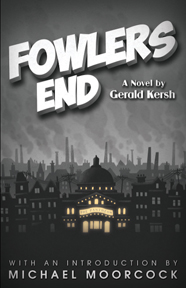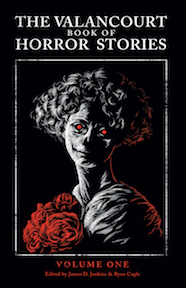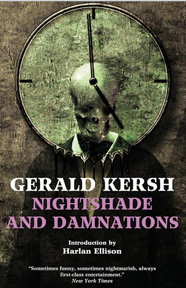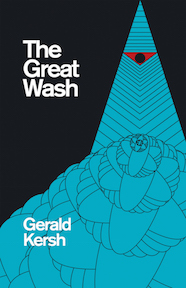|
BOOK DETAILS
Trade paper ISBN-13: 978-1939140098 List Price: $16.99 U.S. Pages: 142 Published: 2015 |
On an Odd Note (1958)
Gerald Kersh With an introduction by Nick Mamatas Book Description
The discovery of piles of bones seeming to belong to a previously unknown species of monster will help to unfold a macabre and grisly tale. – A lady is found dead in her bed, the apparent victim of a murder the coroner proves could not possibly have occurred. – A merman found by fishermen off the coast of Brighton in 1745 will reveal the truth behind one of the most terrible events of the 20th century. – A desperate man makes an ill-advised bargain with a man in black – An extraordinarily horrible dummy exercises a frightful control over his terrified ventriloquist – A condemned murderer lives again through the eyes of an innocent child . . . These are the plots of just a few of the brilliant tales you will find in this volume as you enter the bizarre world of master storyteller Gerald Kersh. With a focus on Kersh's science fiction, fantasy, and horror stories, On an Odd Note (1958) contains thirteen of his best. This first-ever reprint features a new introduction by Nick Mamatas. Contains the following stories: Seed of Destruction, Frozen Beauty, Reflections in a Tablespoon, The Crewel Needle, The Sympathetic Souse, The Queen of Pig Island, Prophet Without Honor, The Beggars’ Stone, The Extraordinarily Horrible Dummy, The Brighton Monster, Fantasy of a Hunted Man, The Gentleman All in Black, and The Eye. |
reviews
“Gerald Kersh had a wild imagination matched by a vivid, near-hallucinatory style. Many of his concepts are so original that they blur the distinction between fantasy, science fiction, mystery, and horror, but the cumulative impact of his short stories is horrific in the extreme.” – Penguin Encyclopedia of Horror and the Supernatural
“Kersh tells a story, as such, rather better than anybody else.” – Pamela Hansford Johnson, Daily Telegraph
“Kersh tells a story, as such, rather better than anybody else.” – Pamela Hansford Johnson, Daily Telegraph
MORE TITLES BY THIS AUTHOR
AUTHOR BIOGRAPHY
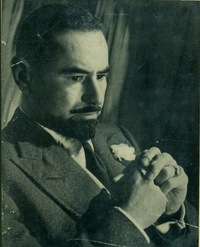
Gerald Kersh was born in Teddington-on-Thames, near London, in 1911. He left school and took on a series of jobs—salesman, baker, fish-and-chips cook, nightclub bouncer, freelance newspaper reporter—and at the same time was writing his first two novels. His career began inauspiciously with the release of his first novel, Jews Without Jehovah, published when Kersh was 25: the book was withdrawn after only 80 copies were sold when Kersh’s relatives brought a libel suit against him and his publisher. He gained notice with his third novel, Night and the City (1938) and for the next thirty years published numerous novels and short story collections, including the novel Fowlers End (1957), which some critics, including Harlan Ellison, believe to be his best.
Kersh fought in the Second World War as a member of the Coldstream Guards before being discharged in 1943 after having both his legs broken in a bombing raid. He traveled widely before moving to the United States and becoming an American citizen, because “the Welfare State and confiscatory taxation make it impossible to work over there, if you’re a writer.”
Kersh was a larger than life figure, a big, heavy-set man with piercing black eyes and a fierce black beard, which led him to describe himself proudly as “villainous-looking.” His obituary recounts some of his eccentricities, such as tearing telephone books in two, uncapping beer bottles with his fingernails, bending dimes with his teeth, and ordering strange meals, like “anchovies and figs doused in brandy” for breakfast. Kersh lived the last several years of his life in the mountain community of Cragsmoor, in New York, and died at age 57 in 1968 of cancer of the throat.
Kersh fought in the Second World War as a member of the Coldstream Guards before being discharged in 1943 after having both his legs broken in a bombing raid. He traveled widely before moving to the United States and becoming an American citizen, because “the Welfare State and confiscatory taxation make it impossible to work over there, if you’re a writer.”
Kersh was a larger than life figure, a big, heavy-set man with piercing black eyes and a fierce black beard, which led him to describe himself proudly as “villainous-looking.” His obituary recounts some of his eccentricities, such as tearing telephone books in two, uncapping beer bottles with his fingernails, bending dimes with his teeth, and ordering strange meals, like “anchovies and figs doused in brandy” for breakfast. Kersh lived the last several years of his life in the mountain community of Cragsmoor, in New York, and died at age 57 in 1968 of cancer of the throat.


